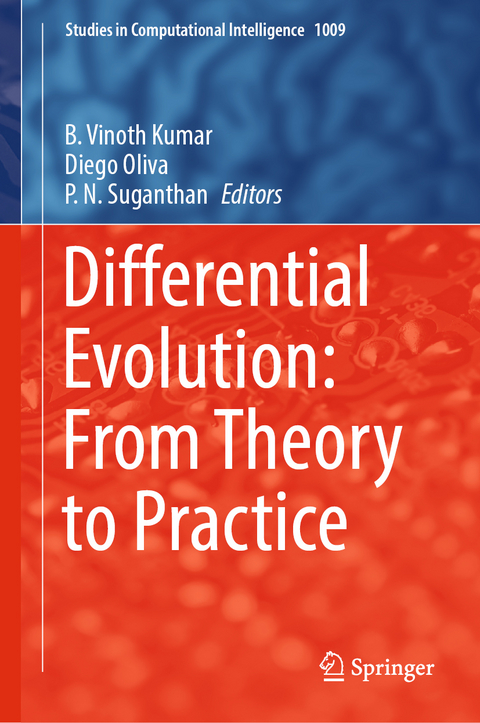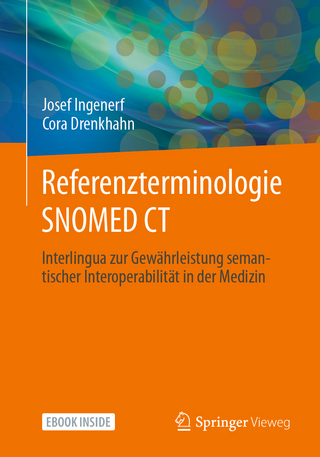
Differential Evolution: From Theory to Practice
Springer Verlag, Singapore
978-981-16-8081-6 (ISBN)
B Vinoth Kumar received the B.E. degree in Electronics and Communication Engineering from the Periyar University, India, in 2003, and the ME and Ph.D. degrees in Computer Science and Engineering from the Anna University, India, in 2009 and 2016, respectively. He is Associate Professor with 17 years of experience at PSG College of Technology, India. His current research interests include computational intelligence, memetic algorithms, and image processing. He has established an Artificial Intelligence Research (AIR) Laboratory at PSG College of Technology. He is Life Member of the Institution of Engineers, India (IEI), International Association of Engineers (IAENG) and Indian Society of Systems for Science and Engineering (ISSE). He is the author of more than 30 papers in refereed journals and international conferences. He has edited four books with reputed publishers such as Springer and CRC Press. He serves as Guest Editor/Reviewer of many journals with leading publishers such as Springer, Inderscience and De Gruyter. Diego Oliva received the B.S. degree in Electronics and Computer Engineering from the Industrial Technical Education Center (CETI) of Guadalajara, Mexico, in 2007, the M.Sc. degree in Electronic Engineering and Computer Sciences from the University of Guadalajara, Mexico, in 2010. He obtained the Ph.D. in Informatics in 2015 from the Universidad Complutense de Madrid. Currently, he is Associate Professor at the University of Guadalajara in Mexico. In 2017, he has been visiting professor at the Tomsk Polytechnic University in Russia. He has the distinction of National Researcher Rank 2 by the Mexican Council of Science and Technology. Since 2017, he is a member of the IEEE. He is a co-author of more than 100 papers in international journals and 5 books. He is part of the editorial board of IEEE Access, Plos One, Mathematical Problems in Engineering and IEEE Latin America Transactions. His research interest includes evolutionary and swarm algorithms, hybridization of evolutionary and swarm algorithms and computational intelligence. P N Suganthan finished schooling at Union College (Tellippalai, Jaffna) and subsequently received the B.A degree, Postgraduate Certificate and M.A degree in Electrical and Information Engineering from the University of Cambridge, UK, in 1990, 1992 and 1994, respectively. He received an honorary doctorate (i.e. Doctor Honoris Causa) in 2020 from University of Maribor, Slovenia. After completing his Ph.D. research in 1995, he served as a pre-doctoral research assistant in the Department of Electrical Engineering, University of Sydney in 1995–96 and a lecturer in the Department of Computer Science and Electrical Engineering, University of Queensland in 1996–99. He was Editorial Board Member of the Evolutionary Computation Journal, MIT Press (2013–2018) and an associate editor of the IEEE Trans on Cybernetics (2012–2018). He is an associate editor of Applied Soft Computing (Elsevier, 2018- ), Neurocomputing (Elsevier, 2018- ), IEEE Trans on Evolutionary Computation (2005 - ), Information Sciences (Elsevier, 2009 - ), Pattern Recognition (Elsevier, 2001 - ) and IEEE Trans. on SMC: Systems (2020 - ). He is a founding co-editor-in-chief of Swarm and Evolutionary Computation (2010 - ), an SCI Indexed Elsevier Journal. His research interests include swarm and evolutionary algorithms, pattern recognition, forecasting, randomized neural networks, deep learning and applications of swarm, evolutionary and machine learning algorithms. His publications have been well cited (Google scholar Citations: ~45k). He was selected as one of the highly cited researchers by Thomson Reuters every year from 2015 to 2020 in computer science. He is ranked worldwide 300-400 among all Computer Science and Electronics Researchers (also include some Control and Communication Engineering researchers) with public Google Scholar profiles.
Analysis of Structural Bias in Differential Evolution Configurations.- Spherical Model of Population Dynamics in Differential Evolution.- Reinforcement Learning-based Differential Evolution for Global Optimization.- Analytical Study on the Role of Scale Factor Parameter of Differential Evolution Algorithm on its Convergence Nature.- The Trap of Sisyphus Work in Differential Evolution and How to Avoid It.- Investigations on Distributed Differential Evolution Framework with Fault Tolerance Mechanisms.- Differential Evolution for Water Management Problems.- Sobol Sequence Based MOSADE Algorithm for Multi-Objective Design of Water Distribution Networks.- A Comparative Study on Parameter Estimation of Covid Epidemiological Models using Differential Evolution Algorithm.- Applications of Differential Evolution in Electric Power Systems.- Detection of Heavy Sandstorm Regions using Composite Differential Evolution Algorithm.- A Hybrid Artificial Differential Evolution Gorilla Troops Optimizer for High Dimensional Optimization Problems.
| Erscheinungsdatum | 28.01.2022 |
|---|---|
| Reihe/Serie | Studies in Computational Intelligence ; 1009 |
| Zusatzinfo | 89 Illustrations, color; 27 Illustrations, black and white; XIV, 381 p. 116 illus., 89 illus. in color. |
| Verlagsort | Singapore |
| Sprache | englisch |
| Maße | 155 x 235 mm |
| Themenwelt | Informatik ► Theorie / Studium ► Algorithmen |
| Informatik ► Theorie / Studium ► Künstliche Intelligenz / Robotik | |
| Mathematik / Informatik ► Mathematik ► Analysis | |
| Mathematik / Informatik ► Mathematik ► Angewandte Mathematik | |
| Mathematik / Informatik ► Mathematik ► Finanz- / Wirtschaftsmathematik | |
| Technik | |
| Schlagworte | Differential evolution • evolutionary computation • hybrid algorithm • memetic algorithm • meta-heuristics • Mutation • Optimization |
| ISBN-10 | 981-16-8081-7 / 9811680817 |
| ISBN-13 | 978-981-16-8081-6 / 9789811680816 |
| Zustand | Neuware |
| Haben Sie eine Frage zum Produkt? |
aus dem Bereich


